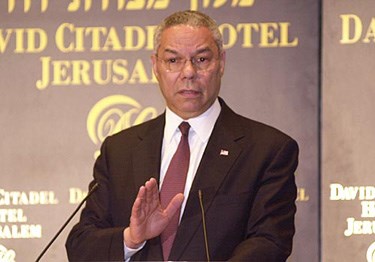Bethlehem crisis festers as Powell ends peace mission
NASHVILLE, Tenn. (BP)--The volatile standoff at Bethlehem's Church of the Nativity cries out for an "urgent nonviolent solution," Secretary of State Colin Powell said April 17.
But he left Jerusalem not having found one during his 10-day mission to seek peace between warring Israelis and Palestinians.
Israeli troops and tanks remained in place around the 1,400-year-old Church of the Nativity where an estimated 250 Palestinian gunmen have been holed up since April 3. Also inside the church are 40 or more clerics and four nuns. At least three Palestinians have been killed in gunfights in Manger Square, the site where Jesus was born according to various Christian bodies.
"I'm deeply concerned about the situation at the Church of the Nativity," Powell said in a departing news conference. "... We are working to see if we can find a solution," he said, volunteering no details or imminent hope.
"Prime Minister [Ariel] Sharon said that he would not assault into that holy place, although we saw there was a fire fight of some kind last night that caused some damage, and that's troubling. But we are trying to find a solution."
Compromise will be necessary in resolving the crisis at the church and the region at large, Powell said. "Both sides will have to make difficult choices. And both sides may well have to shift from long-held positions.
"That's the nature of a negotiation," Powell said. "[L]et's get into that negotiation and see who is willing to compromise what and who is not. But we will never get to a negotiation, and we will never be able to move forward until we bring the violence down" from current levels in which Israeli forces are moving with resolve against the onslaught of Palestinian suicide bombers.
"[C]onfidence between the two sides that existed in some measure previously no longer exists" amid the reality of "so much human suffering that is now taking place," Powell said. "That's what we have to bring to an end as quickly as possible, so then we can get into those kinds of negotiations that will deal with these difficult compromises."
For now, calls for compromise voiced by Israelis and Palestinians quickly ring hollow with each side's unwillingness to take the first step.
Israeli Prime Minister Ariel Sharon said in a CNN interview April 16 that Israeli forces within a week would be leaving all of the Palestinian towns they have entered except for Bethlehem and Ramallah, where Palestinian leader Yasser Arafat has been confined in his battered headquarters.
Israeli troops will not leave Bethlehem, however, until the gunmen in the Church of the Nativity surrender or are expelled from the country, Sharon said. And Israeli troops will not end their presence in Ramallah until various Palestinians wanted for terrorism are in custody.
"We have problems in Bethlehem -- terrorists took shelter in the Church of the Nativity. Once they will leave ... we will be leaving," Sharon said. "They must leave their weapons behind. They have to come [out]. They will be identified. Those who have no connection with terrorism will be released immediately. Those who are connected and had to do with terrorism and murder will be arrested.
"Maybe the Palestinians think in a few days now there will be a change -- Israel will have to leave those places," Sharon continued. "I want to make it very clear: We will leave Bethlehem only after they either are arrested and tried in Israel or deported." He told CNN that a British plane could be utilized in transporting the Palestinians to an undisclosed destination.
Sharon's call for a regional peace conference involving the United States, Israel, Egypt, Jordan, Morocco, Saudi Arabia and Palestinian representatives found preliminary favor among moderate Arab leaders with whom Powell met during his peace mission, The Jerusalem Post reported April 17.
Powell told reporters April 16 that Sharon's refusal to include Arafat in such a conference doesn't necessarily doom the idea. The conference perhaps could begin among high-level officials, including those representing Arafat, Powell said.
Bethlehem's mayor, Hana Nasser, meanwhile has said he intends to appeal to Pope John Paul II to come to the city to help bring peace, the Associated Press reported April 18.
"If we cannot reach a reasonable agreement [with the Israelis] that could guarantee and protect those inside the church, I have no other choice but to invite the holy father, the pope, to come to the Holy Land and visit the town of Bethlehem in order to save the mother of churches, the Church of the Nativity," Nasser said.
The Vatican had issued no response to Nasser's statement, the AP reported.
On April 13, leaders of various Catholic, Orthodox and evangelical churches in Jerusalem proposed a solution to the Israeli-Palestinian tensions in a meeting with Powell. The AP did not specify which churches were represented in the exchange. The leaders urged a three-day Israeli withdrawal from Bethlehem to permit the armed Palestinians inside the church to lay down their weapons and go home, the AP reported.
A 16-year-old Palestinian who escaped from the church April 15 told reporters of the stench of rotting bodies and gangrenous wounds permeating the inside of the church; the sight of one wounded Palestinian's exposed intestines; one toilet being shared by all; and sleepless nights stemming from loudspeakers deployed by the Israelis blaring the sounds of approaching helicopters, tanks and barking dogs.
Describing the Palestinian gunmen's resolve in the church, the youth quoted them as saying, 'Rather than surrender, we'll go out shooting.'"
(BP) photo posted in the BP Photo Library at http://www.bpnews.net. Photo title: NOT YET.










